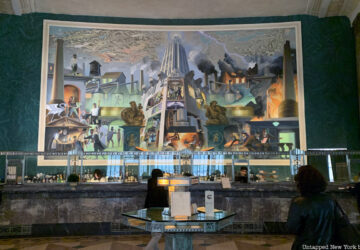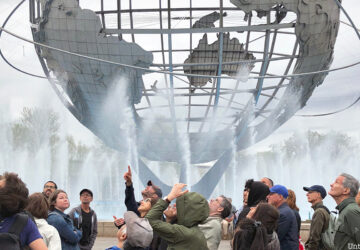New York City’s simmering racial tensions periodically erupt after traumatic events like the death of Eric Garner. On February 4, 1999, policemen fired 41 shots at Guyenese immigrant Amadou Diallo in a case of mistaken identity. The event shook the City, becoming a turning point in public sentiment towards Mayor Rudy Giuliani’s aggressive policing strategy.
Not long after midnight, the 23 year-old Diallo was outside of his apartment, having just grabbed a bite to eat. Four police officers drove by: Edward McMellon, Sean Carroll, Kenneth Boss and Richard Murphy. They were part of a plain-clothed Street Crime Unit, and they were searching the area for a serial rapist.
Though the lighting outside of Diallo’s building was dim, the police thought Diallo resembled the rapist, or was perhaps trying to break into the building. They jumped out of their car, drew their guns, and shouted, “Police!” When Diallo removed his wallet to show his identification, Carroll yelled, “Gun!” The officers began firing on Diallo from close range on the building staircase, and when McMellon tripped and fell backwards, his colleagues thought he had been shot. After he was dead, a search of Diallo’s person revealed that he had no weapon, and was likely trying to produce his immigration papers. Diallo was struck by 19 of the bullets.
As is often the case in police killings, some tried to stereotype Diallo as a trouble-making “street peddler,” when in fact he sold gloves and hats downtown, had no record, and was saving money for a college education.
The four officers were indicted for second-degree murder in the Bronx, but their trial was moved to Albany on the grounds that they could not obtain a fair trial in the Bronx. The Albany jury acquitted all four of the officers of all charges. Boss is the only one of the four officers still with the police force; he was reassigned his gun in 2012. Carroll later offered an emotional apology.
The subsequent protests, noted for their interracial composition, lasted for weeks, with activists making very similar policy demands to those being made after Eric Garner’s death. Another round of tense protests followed the acquittals. The Coalition Against Police Brutality, which had formed a few years earlier after a different set of policing incidents, drove many of the protests, and its lawsuit ,Daniels v. City of New York, led to the disbanding of the Street Crimes Unit and the release of police arrest data. Police Commission Howard Safire was eventually replaced by Bernie Kerik, who pledged a (partial) return to community policing. Bruce Springsteen and Wyclef Jean both wrote songs about the shooting.
Settlement from Diallo’s wrongful death lawsuit was used to set up a scholarship fund and start the Amadou Diallo Foundation (run by his mother, Kadi), which is hosting an event on improving race relations tomorrow morning at Columbia’s SIPA program.
To learn more about New York City’s political history, visit Janos.nyc.





